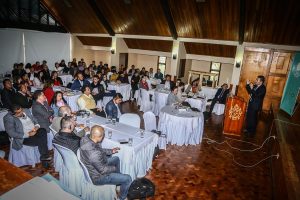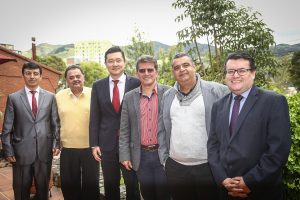 Pasto, Colombia- May 24 – The GGGI Colombia team, in partnership with the Norwegian Embassy in Colombia, held a training session to accelerate its sub-national green growth program on the ground.
Pasto, Colombia- May 24 – The GGGI Colombia team, in partnership with the Norwegian Embassy in Colombia, held a training session to accelerate its sub-national green growth program on the ground.
The Government of Nariño and GGGI co-organized a multi-stakeholder training, entitled “Journey with Green Growth: From Planning to Action”, designed to strengthen local stakeholders’ capacity on green growth. One hundred people from the public and private sectors, including academia in Nariño Municipality, gathered together in Pasto, its capital city, in the first of its series of joint multi-stakeholder training for green growth.
The training topics included green growth conceptual issues, policy formulation, project structuring, and green financing landscapes, facilitated by GGGI together with external expert speakers. Participating organizations included the National Planning Department (DNP), the Regional Autonomous Corporation of the basins of the rivers Negro and Nare (CORNARE) from the Department of Antioquia, and the Financial Institution for Development (FINDETER).
The Planning Secretary of the Government of Nariño said, “This gathering is particularly meaningful for local stakeholders in Nariño to learn global and national-level direction and recommendations on green growth, and sub-national level best practices to benchmark.”
 This workshop is a part of the institute’s technical support to the Government of Nariño to enhance their capacity of green growth in terms of planning and project structuring.
This workshop is a part of the institute’s technical support to the Government of Nariño to enhance their capacity of green growth in terms of planning and project structuring.
Going forward, GGGI will support Nariño to reinforce planning instruments, particularly performance assessment tools to incorporate green growth elements into the current planning and investment system, and to structure a bankable project that can demonstrate a locally customized green growth, with arranging proper domestic and/or international financing. GGGI will continue to organize training sessions based on the identified priorities and demands of the region.